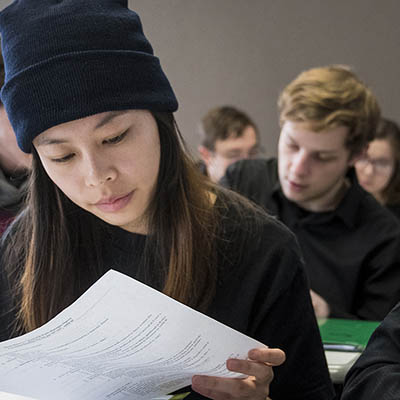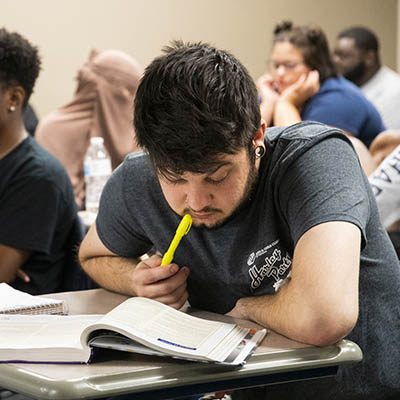
What is general education?
The general education component of a college degree is intended to give you a broad foundation of knowledge that will support your academic, professional and civic pursuits. General education also allows you to explore disciplines you may not be familiar with, potentially sparking new areas of interest and passion. The foundation provided by general education equips you with the understanding and skills needed to navigate and engage with our rapidly changing world throughout your life. This comprehensive approach to education is what differentiates the education provided by a university from a professional or technical school.
Washburn follows the Kansas systemwide general education framework. General education requirements include a range of coursework in English composition, mathematics and statistics, communication studies, natural science, arts and humanities, social science, inclusion and belonging, and scientific reasoning and literacy.
How general education sets you up for success
Boost academic skills
You'll build the core skills that help you thrive in your major and make sense of what you're learning.
Grow personally
Exploring different subjects can spark new interests, inspire passions and even help you discover your path.
Stand out to employers
Gen ed classes help you sharpen in-demand skills—like communication, problem-solving and critical thinking—that employers look for in every field.
See the bigger picture
You'll get exposed to new perspectives, cultures and ideas that help you understand the world and tackle real-world challenges.

Take the math class that meets you where you are, to get you where you're going!
At Washburn, we want every student to have a math experience that prepares them for success in their courses, careers and everyday life. Washburn University is part of the Kansas Math Pathways initiative, coordinated by the Kansas Board of Regents. Math Pathways is a national effort to modernize math education and give students the support they need through a more focused and personalized approach. The Kansas Math Pathways initiative supports this goal by offering:
- Gateway math courses: Faculty in each major have chosen a "gateway" math course that fits your program and future goals. This course also fulfills the general education math requirement for the corresponding bachelor's degree.
- Multiple placement measures: Instead of relying only on a standardized test, we offer several ways for you to show you're ready for college-level math.
- Corequisite math support: While you're taking your gateway math course, you'll have access to free, built-in math support. The type and amount of help you receive is tailored to your needs so you can succeed.
The Kansas Math Pathways initiative will be fully in place by Fall 2026. Starting then, all current students who have not yet completed their general education math course will benefit from the multiple placement measures and corequisite math support. New students will take the gateway math course selected for their major.

Get the writing support you need
Strong writing skills are essential—not only for your success at Washburn, but throughout your life and career. Washburn is committed to helping students become confident, effective writers.
In your first-year English composition course, you'll receive tailored support to develop your writing abilities. Beyond the classroom, our Writing Center is available to all students for any class, offering one-on-one tutoring and guidance whenever you need it.
Why should you take your general education courses at Washburn?
Washburn has a reputation for excellence in general education courses. Our advisors and instructors will help you tailor your general education courses to make the most of your college experience and put you on a path to success for future college study and life.
Frequently asked questions about general education
Yes, you can complete general education requirements through high school CEP (concurrent enrollment partnership) classes. We encourage students to talk to an advisor at Washburn to ensure they are taking CEP classes that make the most sense for their specific academic interests and educational goals.
Some students may fulfill specific general education requirements with Prior Learning Credit. One example of prior learning is taking a College Level Examination Program (CLEP) test. Additional information about how Washburn accepts credit for prior learning.
We encourage students to work closely with their academic advisor in selecting general education courses. In some programs, there may be courses that can fulfill both general education requirements and program requirements. If you’re having trouble selecting a class to fulfill a particular general education requirement, consider the following:
- Build on your strengths: If there is a course or content area that you feel confident about, go ahead and build on your strengths. Each course will likely offer new methods and skills for approaching the subject.
- Develop a skill or try something new: If there is a course or topic that will challenge you, or perhaps complement a skill or approach taught in your major discipline, we encourage you to try it.
- Explore: Many general education courses are also required by specific majors or minors at Washburn. Use your general education requirements to discover these subjects and try out a major, minor, or certificate program.
Most students will take their general education classes within their first two years of study, but some majors may ask students to take general education classes during later years. Because general education classes teach important skills that can be applied to other subjects and topics, taking these classes early can encourage success in future major and minor coursework.
No, general education classes are required by all majors, so you can change your major and still use completed general education courses toward your general education requirements. But please note that some majors require courses that are also on the general education list. If your new major requires a class on the general education list, you will need to complete that class for your new major, even if you've already fulfilled the general education requirement that course falls under.
Yes. If a student completed all general education requirements at another institution participating in Kansas systemwide general education prior to transferring to Washburn, their general education requirements at Washburn are also considered complete and no additional general education courses are required. The exception to this is if there are courses required by a student’s major program that are also general education courses. The transfer student would then have to complete any of these unmet program requirements.
If a student completed some general education requirements at another participating institution, courses transferred in as general education from another institution must be counted as general education at Washburn. The only exception to this would be courses a student took to fulfill the requirements for the institutionally designated areas at another institution, and if these courses did not apply in other areas at WU or to our own institutionally designated areas.
Frequently asked questions about Math Pathways
Contact an advisor


